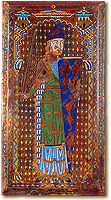![]() Geoffrey
Plantagenet and the conquest of Normandy
Geoffrey
Plantagenet and the conquest of Normandy
 True to their approach during the
periods of weakness in their power, the Norman barons took advantage of the
rivalry between Matilda and Stephen to launch themselves once more into
private wars which set them against each other, and divided them between the
two pretenders.
True to their approach during the
periods of weakness in their power, the Norman barons took advantage of the
rivalry between Matilda and Stephen to launch themselves once more into
private wars which set them against each other, and divided them between the
two pretenders.
The situation was all the more complex in that many of these barons had domains on both sides of the Channel. In the struggle for the throne, England and Normandy were thus inseparable.
The first phase of the conflict was favourable to Stephen who enjoyed the prestige of royal dignity and gave his homage to the King of France for the Duchy of Normandy (1137) while Geoffrey of Anjou conducted pillaging operations without definitive outcomes in 1136 and 1138.
Subsequently, Geoffrey and Matilda received the notable support of Robert of Gloucester, the bastard son of Henry I, who held the Caen and Bayeux regions of Normandy. Abandoning the conduct of operations in England to his wife, Geoffrey initially managed to assert his power in the west and centre of Normandy.
Finally in 1144 he took Rouen and the castle of Arques from the partisans of Stephen and obtained from the King of France recognition of the ducal title in exchange for the fortress of Gisors. This abandonment had within it the seeds of new conflicts to come between the Plantagenet and the Capetian for control of the Vexin.
Between 1144 and 1150, Geoffrey of Anjou was committed to re-establishing order in the Duchy that he was to pass on to his son Henry before he died (1151). In the meantime Matilda led the conflict against King Stephen, but while the force of arms was favourable to her husband Geoffrey in Normandy, in England she met with a lack of success.